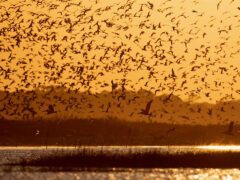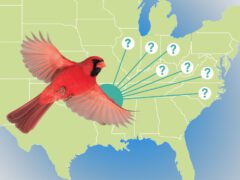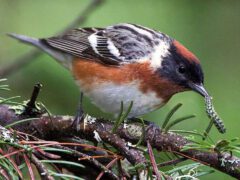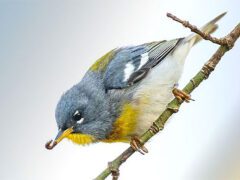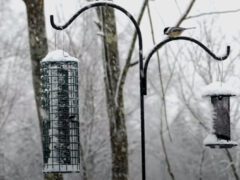Fox Sparrow Similar Species Comparison
Main SpeciesFox Sparrow
Adult (Red)
Large, chunky sparrow with a rounded head and heavy bill. Plumage varies significantly across range. The "Red" subspecies group is rich reddish brown with coarse, blurry streaks below.
© Evan Lipton / Macaulay LibraryRhode Island, February 11, 2017Adult (Sooty)
Large, chunky sparrow with rounded head. The "Sooty" subspecies group lives along the Pacific Coast. Upperparts are dark brown; face is grayish; bill is gray and yellow.
© Ian Davies / Macaulay LibraryCalifornia, October 16, 2020Adult (Red)
A large, round-bodied sparrow with a stout bill. “Red” Fox Sparrow is rusty above with some pale gray on the head and rufous splotches on the underparts.
© Brad Imhoff / Macaulay LibraryOhio, February 04, 2022Adult (Thick-billed)
Large sparrow with very thick bill. The "Thick-billed" subspecies group lives mainly in the Sierra Nevada and Cascade mountains of California and Oregon. Slate gray head and back with brown wings and tail; heavily spotted underparts.
© Scott McCusker / Macaulay LibraryCalifornia, April 10, 2017Adult (Slate-colored)
Large, chunky sparrow. Head and back are gray; wings and tail are bright rufous. The "Slate-colored" subspecies group breeds in interior western North America and winters mainly along the Pacific Coast.
© Darren Clark / Macaulay LibraryIdaho, April 15, 2019Adult (Red)
Males sing a sequence of about a dozen rich, whistled notes lasting 2–3 seconds in all. During summer they sing vigorously at any time from before dawn until after dark.
© Larry Arbanas / Macaulay LibraryAlaska, June 09, 2007Juvenile (Sooty)
Juveniles are similar in plumage to adults, but generally duller overall. Large size and heavy bill are helpful in distinguishing from other sparrows.
© Mason Maron / Macaulay LibraryWashington, August 10, 2020Adult (Red)
Most Fox Sparrows have yellowish bills with gray tinges to the upper mandible. The "Red" subspecies group has a mostly gray face with variable reddish brown on the cheek.
© Fyn Kynd / Macaulay LibraryNew York, October 27, 2020Adult (Red)
Forages on leaf litter and bare ground, using sturdy legs to kick away leaves in search of insects and seeds.
© Sam Zhang / Macaulay LibraryMassachusetts, November 26, 2023Adult (Red)
Found on or near the ground in thickets, overgrown fields, spruce-tamarack bogs, woodland edges, willow and alder tangles, chaparral, manzanita, and other dense brushy areas.
© Luke Seitz / Macaulay LibraryMaine, April 03, 2017Adult (Sooty)
Some "Sooty" Fox Sparrows are a more flat gray brown without the reddish tones. The heavy spots (often chevron shaped) coalesce into larger patches on the breast.
© Ryan Schain / Macaulay LibraryWashington, November 05, 2018Adult (Slate-colored)
The "Slate-colored" subspecies group has a gray head, reddish wings and tail, and black spotting on white underparts.
© Jay McGowan / Macaulay LibraryMontana, June 23, 2015Adult (Thick-billed)
The "Thick-billed" subspecies group has a massive bill, grayish head and back, reddish-brown wings and tail, and heavy dark spotting on white underparts.
© Steve Rottenborn / Macaulay LibraryCalifornia, July 12, 2018Adult (Thick-billed)
Males often sing from high perches. Songs and calls vary geographically.
© Jay McGowan / Macaulay LibraryCalifornia, June 12, 2012Similar SpeciesSong Sparrow
Adult/immature
Song Sparrows are smaller than Fox Sparrows and have grayish instead of yellowish bills. Song Sparrows have coarse breast streaks whereas Fox Sparrows have heavy chevron-shaped spots that coalesce into blotches.
© Ryan Schain / Macaulay LibraryVermont, May 22, 2017Similar SpeciesSong Sparrow
Adult/immature
Song Sparrows and Fox Sparrows both vary extensively across their range. Song Sparrows have a grayish bill, a stripe through the eye, and coarse streaks instead of spots on the breast.
© Steven Mlodinow / Macaulay LibraryWashington, December 28, 2010Similar SpeciesSavannah Sparrow
Adult (Savannah)
Savannah Sparrows are smaller than Fox Sparrows and have smaller bills and shorter tails. They are more finely streaked and usually have yellow above the eye.
© Kirk Swenson / Macaulay LibraryCalifornia, November 11, 2016Don't miss a thing! Join our email list
The Cornell Lab will send you updates about birds,
birding, and opportunities to help bird conservation.













































